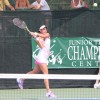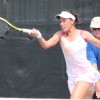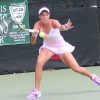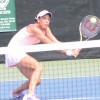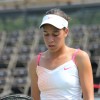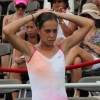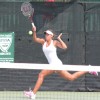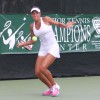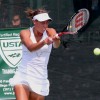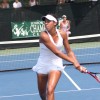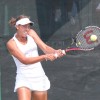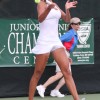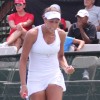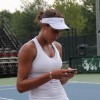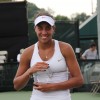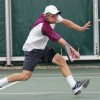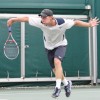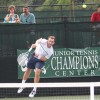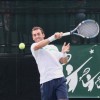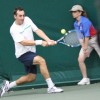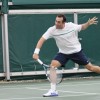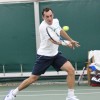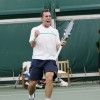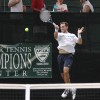[youtube=http://www.youtube.com/watch?v=0STcXzGwi5g&w=560&h=343]
By Christopher Lancette
College Park, MD – And the awards go to …? A precocious 16-year-old with a swing and maturity beyond her years, and a 29-year-old fighting to get back to where he used to be. That’s who won the final two spots today in the main draw of the U.S. Open – Madison Keys and Bobby Reynolds.
They deserved them.
Keys entered the playoff as the seventh seed (out of eight) and grew up a little bit more this week – not just into her increasingly tall frame but into a young woman who is already figuring out how to change her game when she’s playing poorly. Even she would admit she looked awful in the first set against higher seed Beatrice Capra, who won this event last year and then knocked out two opponents in the U.S. Open. Keys dropped the first set 3-6 but found her game in the second – taking it 7-5. She owned the third set 6-0.
“I’ve just been working on it for so long,” she said of the tennis IQ she displayed today. “Obviously, I still have times when I come off the court and I think I just played like a total moron. I think after the first set I kind of focused a little bit more and tried to play smarter.”
The second set didn’t start with promise. Though she held her first serve and pinned Capra to love-40 in the next game, she made five straight errors. Capra, a 19-year-old who reports to Duke University on Monday, broke Keys in the next game and increased her lead to 3-1 when she held her next serve.
That’s when Keys realized she wanted to control her own post-match travel plans.
“I kind of just decided that I didn’t want to go to New York tonight,” she said, referring to the fact she would have had to catch a train to the U.S. Open for qualifying that starts on Tuesday. “I wanted to go next week. I just focused on trying to stay in the match and, hopefully when I had the chance, try to change things around.”
She did, with vengeance.
She held her serve and broke Capra’s next serve with a display of power and patience. Down 15-30, she ran Capra around and crushed a forehand crosscourt winner. She followed that up with a backhand heater for another winner. She cracked another right-handed winner and let the next point unfold, waiting for the chance to take a step forward and blast yet another forehand winner.
Keys was clearly assessing what was happening on the court, dialing back the radar gun for a while so she could extend points and then turn up the speed.
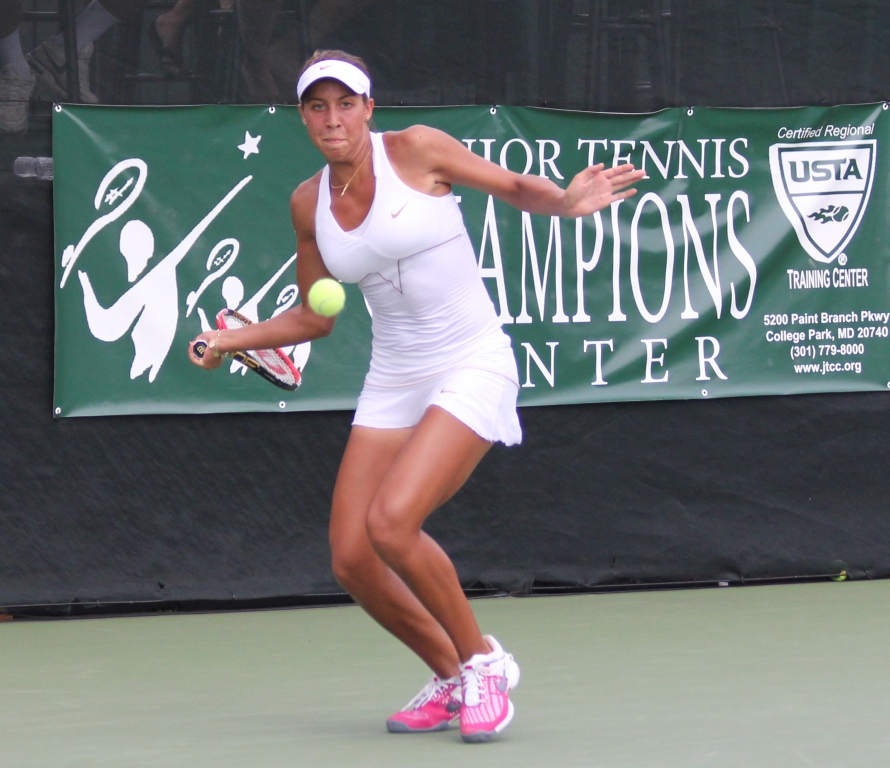 Madison Keys Madison Keys |
That’s hard for anyone to do, let alone someone who is barely old enough to drive but whose parents won’t let her get a car. Check out our video interview with Madison Keys.
“If you’re not making the ball, you have to adjust and figure out what’s going wrong,” she said. “I kept missing it long, so I decided to take some pace off and try to keep the ball in play and then wait for that one ball to where I could rip it again. Once I started feeling confident with my shot, I started putting a little bit more pace on it.”
Keys never really looked back from there as the error pendulum swung the other way. Capra got tight and made mistakes, losing her confidence as dreams of a return trip to the U.S. Open faded.
“I had a game plan against her and in the first set I thought I was executing it pretty well,” a heartbroken Capra said after the match. “I didn’t want to pull her out wide too much because I knew she was dangerous on the run. In the second set, I got a little tight and nervous and started thinking about it (the possibility of returning to the Open). After she saw I was getting tight, she took advantage of it.”
Keys cruised across the finish line and then did what every pro player seems to do now: She pulled a phone from her bag, pounded out a quick text message, and made a call.
“I called my mom,” Keys said. “Mom was on the beach walking around and she was just saying how happy she was and how proud she was. My coach was texting her during the match. She was also telling me how she was talking to herself and probably looking like a crazy person.”
Asked what the best part of winning the playoff was, she didn’t give the obvious answer of making it to the U.S. Open.
“I think the best part is being down and just really digging and coming back,” she said, making no mention of the major tournament on the horizon or the paycheck that comes with simply making it to the first round. “That just makes me really proud of myself, and I know I can do it.”
The veteran Bobby Reynolds knew he could do it, too, even if he had to do some digging of his own in the second set to pull out the 6-2, 7-5, 6-4 victory over Daniel Kosakowski, a 19-year-old who turned pro after playing one season at UCLA.
“I feel relieved. Very relieved,” said Reynolds, who recently led the Washington Kastles to a World Team Tennis title and had a lot Kastles’ fans cheering for him at every playoff match. “It was very tough and it was important for me to get out to a fast start.”
Reynolds’ victory had that feel-good ending to it, much as American tennis fans are pulling for fellow 29-year-old Mardy Fish. Reynolds was a Top 65 player until a wrist injury at the 2009 French Open sidelined him for seven months. Ranked No. 120 now, his next goal is to make it back into the Top 100.
“It’s never too late,” he said of anyone chasing a dream but fearing age may limit them.
The Hollywood finale almost got re-written in he second set when Kosakowski flexed young muscle and put Reynolds in a 2-5 hole.
Reynolds mixed up his attack by coming into the net more often as he did with a serve-and-volley winner and another volley winner to pull one game closer. Kosakowski tossed in a double fault and three errors on the ground during his next service game. Reynolds tied the set at five-all when he closed the game with a forehand crosscourt winner that sent Kosakowski sprawling to the ground.
 Bobby Reynolds Bobby Reynolds |
“You could see that 90 percent of my game is just standing out there fighting, putting another ball back and sticking with my game plan,” Reynolds said. “I was able to take advantage of that lax game he served at 5-3 and from then on I felt like the momentum changed back to my favor again.”
As he and Kosakowski banged away on the indoor court they were forced to play on due to rain, lightning bolts flashed outside the doors while thunder boomed through the Tennis Center at College Park bubble.
“I felt like there was going to be a tornado right outside,” Reynolds said, and he was not alone. “I was wondering when (the chair umpire) was going to look at us and tell us we had to stop play.”
Play continued and Reynolds used the lightning into spark his third-set closer. He made the shot of the match when he was up 3-1: Kosakowski ran Reynolds from baseline to baseline but Reynolds answered by lunging for a two-handed backhand and flicking it past the charging Kosakowski for a winner. Kosakowski double-faulted on the next point to go down 1-4.
To his credit, the former Bruin didn’t give up, trading the next several games. Reynolds ultimately took over using his booming serve and powerful ground strokes to keep Kosakowski well behind the baseline for the final games of the match.
“You might say I don’t have the most talent, but I have a lot of heart and fight out there,” Reynolds said.
Reynolds now heads home to Atlanta to give an injured stomach muscle some rest and plans to arrive at his fifth U.S. Open later in this week.
“I hope I don’t see my name next to some guy with a number next to his,” Reynolds quipped.
Follow us on Twitter @worldtennismag.
Photo credit © Won-ok Kim

